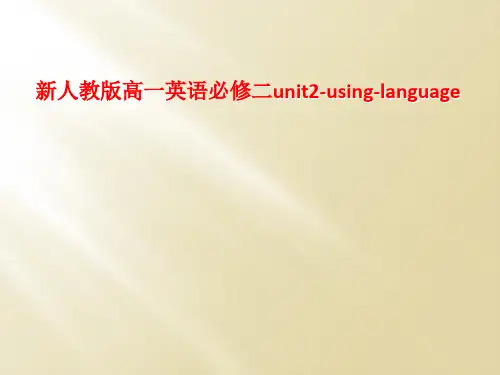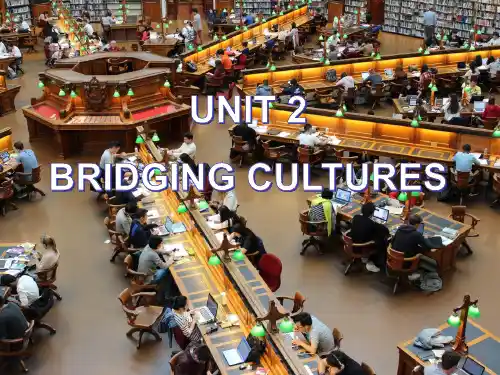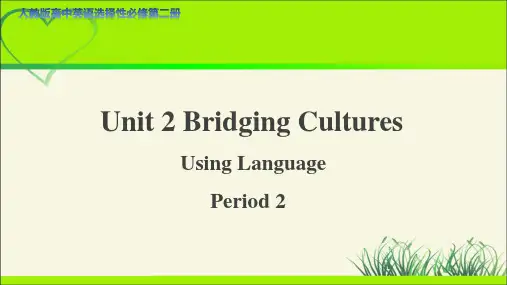人教高中英语必修2Unit2 Using Language
- 格式:ppt
- 大小:4.81 MB
- 文档页数:3
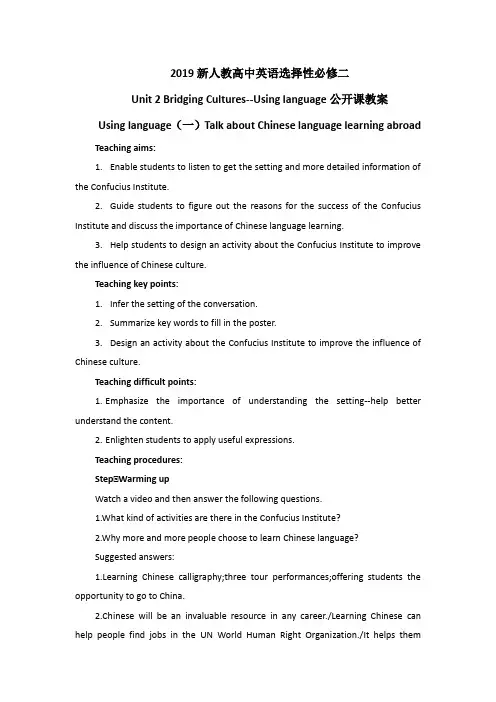
2019新人教高中英语选择性必修二Unit 2 Bridging Cultures--Using language公开课教案Using language(一)Talk about Chinese language learning abroad Teaching aims:1.Enable students to listen to get the setting and more detailed information of the Confucius Institute.2.Guide students to figure out the reasons for the success of the Confucius Institute and discuss the importance of Chinese language learning.3.Help students to design an activity about the Confucius Institute to improve the influence of Chinese culture.Teaching key points:1.Infer the setting of the conversation.2.Summarize key words to fill in the poster.3.Design an activity about the Confucius Institute to improve the influence of Chinese culture.Teaching difficult points:1.Emphasize the importance of understanding the setting--help better understand the content.2.Enlighten students to apply useful expressions.Teaching procedures:StepⅠWarming upWatch a video and then answer the following questions.1.What kind of activities are there in the Confucius Institute?2.Why more and more people choose to learn Chinese language?Suggested answers:1.Learning Chinese calligraphy;three tour performances;offering students the opportunity to go to China.2.Chinese will be an invaluable resource in any career./Learning Chinese can help people find jobs in the UN World Human Right Organization./It helps themconnect with Chinese people on a more personal level.StepⅠ ListeningActivity 1Listen for the setting and gist.1.Where does this conversation take place?2.Who are the people speaking?3.What are they talking about?Suggested answers:1.In a radio studio.2.A host and a Chinese teacher Aisha Khan.3.Chinese learning in the Confucius Institute in Karachi,Pakistan.Activity 2Listen for key details,take notes and then fill in the poster.Suggested answers:speak Chinese;Chinese culture;a few students and teachers;Chinese activities;trade between China and Pakistan;Chinese companies;cultural barriers Activity 3Answer the questions according to what you remember of the conversation.1.What made Aisha feel like she was part of Ms Hu’s family?2.Why did Aisha want to become a teacher?3.Why do students learning Chinese see it as beneficial to their future?Suggested answers:1.During Chinese New Year,families usually sit together and makedumplings.Eating those delicious dumplings together in Ms Hu’s home,they felt like a family!2.She knew the important role language and cultural exchange would play in the future,so she wanted to become a teacher.3.Because it can break down language and cultural barriers and many students go to work at Chinese companies.StepⅠRole-play1.Work in groups of four:One acts as the interviewer and the other three act as the students from the Confucius Institute.The interviewer interviews the students about their experience of learning Chinese language and Chinese culture.You may refer to the following expressions.2.Practise the interview within your group.3.Present your interview before the whole class.4.The interviewer of each group gives a report of the interview before the whole class.Sample dialogue:A:Hi,Jane.Welcome to the show!B:Thanks for inviting me.A:Tell us,what was your biggest challenge in learning Chinese at the beginning?B:Well,I suppose it was difficult to grasp the tones at first.A:I bet!Did joining the Confucius Institute help overcome this problem?B:Absolutely!Getting involved with Chinese cultural activities there definitely helped a lot...Suggested answers:A:Hi,Jane.Welcome to the show!B:Thanks for inviting me.A:Tell us,what was your biggest challenge in learning Chinese at the beginning?B:Well,I suppose it was difficult to grasp the tones at first.A:I bet! Did joining the Confucius Institute help overcome this problem?B:Absolutely! Getting involved with Chinese cultural activities there definitely helped a lot.I got to practise my Chinese on a daily basis,and I could learn how native Chinese speakers spoke.A:What do you feel is your biggest achievement?B:Learning Chinese characters! I have learnt about 1,500 so far.When I first started,I didn’t think it was even going to be possible to learn so many,but now I find that I can read signs,menus,and even some easy newspaper articles.A:What are you most keen on?B:I’ve really become keen on learning more about Chinese culture,Chinese calligraphy in particular.As I have learnt Chinese characters,I have developed a great appreciation for their meaning.I want to explore Chinese characters by learning how to write them in a more beautiful way.A:Finally,what do you want to say to anyone interested in learning Chinese?B:I’d say,give it a shot! While some aspects may be difficult,it is rewarding and you will be happy that you have tried.A:Thanks for your time.B:You’re welcome.Using language(二)Express your opinions on studying abroadTeaching aims:1.Enable students to read the two letters as a whole to summarize each writer’s standpoint and reasons for studying abroad.2.Write an essay to express your own opinions about studying abroad to analyse the phenomenon more comprehensively and objectively.3.Make a debate to exchange your views on studying abroad.Teaching key points:1.Guide students to get the opinions of the writer’s and summarize the type and structure of the two letters.2.Inspire students to have an objective attitude towards studying abroad..Teaching difficult points:1.Enable students to figure out the structure and language features of the text.2.Write an argumentative letter to express the opinions about studying abroad using connectors.Teaching procedures:StepⅠLead-inT:1.Which school will you choose if you have a chance,Tsinghua University or Harvard University?2.In your opinion,why are there so many people wanting to study abroad?3.What kind of advantages or disadvantages of studying abroad?Suggested answers:1.The answers may vary.2.Perhaps because they think studying abroad can broaden their horizons and improve their general competence.3.The answers may vary.StepⅠ While-readingActivity1:Read for the main idea,supporting reasons and type1.Go through the title and the two letters quickly to summarize what the two letters mainly talk about.2.Underline the reasons for the writers’ opinions.3.What’s the type of the two letters?Suggested answers:1.The first letter talks about the disadvantages of studying abroad for young people are greater.The second letter talks about the advantages of studying abroad are much greater.2.Reasons for the first opinion:To begin with,many students who study abroad face great economic pressure.Another important factor to consider is the tremendous pressure that comes with studying abroad.A final point to consider is that while studying abroad does have potential benefits,young people who study in China also have a great future to look forward to!Reasons for the second opinion:The first advantage of studying abroad is personal growth.Another advantage is the increased chance for cultural exchange.Finally,studying abroad provides a great opportunity to contribute to the development of our motherland.Activity2:Read for the language and structure features of the letters1.Read the letters again and then underline the connectors.Then think about other connectors from “Connectors expressing opinion” and “Connectors expressing reasons or evidence”.Connectors expressing opinion Connectors expressing reasons or evidencePoint of view:Listing:Summary:Cause & effect:Restating:Giving examples:2.Read the letters again and then use the connectors in the box to rewrite the following sentences.(1)Students who want to study abroad must consider their parents’ budget.Theyshould think about whether they can afford the costs of studying overseas.(2)Studying abroad can put great pressure on young people.They may feel lonely and miss their families.(3)Studying abroad will give students a good education.It also helps them to gain a global perspective.(4)Global development strategies help to make connections between China and the rest of the world.Young people with language skills and strong cultural awareness are needed.3.Mark the parts of the argument in the letters,and then summarize the outline of an argumentative letter.A.Start with a question or a fact.B.State an opinion.C.Give reasons and evidence to support an opinion.D.State a conclusion.Suggested answers:1.Focus on the structureThe letter from Wang Li:although,to begin with,that means,in addition,while,as,to sum up,so.The letter from Zhang Yi:but,in my opinion, as, for example,because,thus,finally,such as,therefore,all in all,while.Connectors expressing opinion Connectors expressing reasons or evidencePoint of view:in my opinion as far as I knowas far as I am concernedpersonally(speaking)Listing:to begin with what is more besides moreoverin additionSummary:in short to sum up all in all Cause & effect:because as so thusin conclusion/summarygenerally speakingtherefore as a resultRestating:in other words that is to say that meansGiving examples:for example for instance such as2.(1)Students who want to study abroad must consider their parents’ budget.This is to say,they should think about whether they can afford the costs of studying overseas.(2)Studying abroad can put great pressure on young people.For instance,they may feel lonely and miss their families.(3)Studying abroad will give students a good education.Besides,it also helps them to gain a global perspective.(4)Global development strategies help to make connections between China and the rest of the world.As a result,young people with language skills and strong cultural awareness are needed.3.A:In the past few decades,there has been a dramatic increase in the number of people studying abroad./Is studying abroad a good idea or not?B:Although studying abroad can bring great benefits,I think the disadvantages for young people are greater./There are certainly disadvantages,but in my opinion,the advantages are much greater.C:Paragraphs 2~4 in each letterD:Paragraph 5 in each letterOutline:Part 1Start with a question or a fact.State an opinion.Part 2Give reasons and evidence to support an opinion.Part 3State a conclusion.StepⅠ WritingWrite an argumentative letter about studying abroad and form a correct attitude towards it.Exchange the draft with your e the checklist to help youreview your partner’s draft.And then revise your draft according to your partner’s comments.Suggested answers:Dear Editor,Many people have asked the question,“Why do teenagers study abroad?”After all,there are many great universities and schools in China that attract great professors from home and abroad.I think that while this is true,this gets things lightly wrong.The question is not that people think the quality of their local university is not adequate,but how studying abroad helps and benefits the individuals in their own study and career plans.By studying abroad,Chinese students get a better understanding of other cultures and countries,and learn to see themselves as global citizens.As a result,they can better understand China’s place in the world and how they can contribute to world peace and development.In addition,overseas students can learn cross-cultural communication skills,which will help them understand how they can participate on the world stage.There are so many places in the world with hurting,needy people.With such skills and knowledge,the students can better lend them a helping hand.Finally,when our students return home,they can share their experience with others.There is a wide open world which they can contribute to if they first learn about people from other countries,and their struggles and challenges.In conclusion,the best way to get is giving,and the easiest way to be loved is loving others.I hope everyone will agree that there is a wonderful world out there which can be made better by our presence,but we need to learn how we cancontribute and help,and how we can best do this through studying abroad.Best regards,Liu Ping StepⅠ Make a debate to exchange your view on studying abroad.Suggested answer:The answers may vary.。
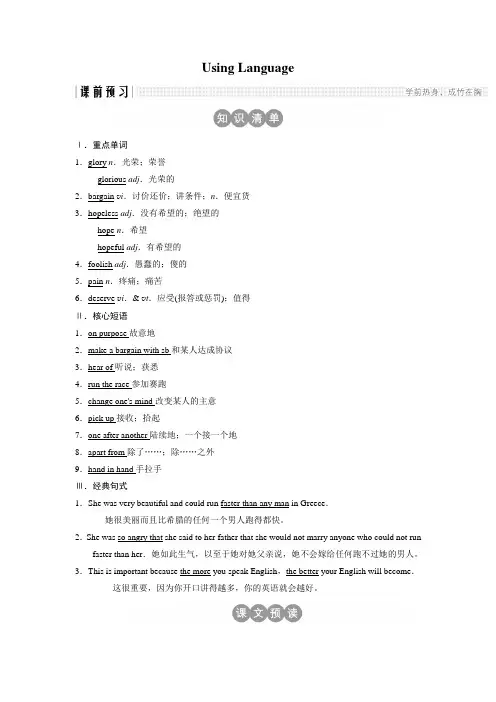
Using LanguageⅠ.重点单词1.glory n.光荣;荣誉glorious adj.光荣的2.bargain v i.讨价还价;讲条件;n.便宜货3.hopeless adj.没有希望的;绝望的hope n.希望hopeful adj.有希望的4.foolish adj.愚蠢的;傻的5.pain n.疼痛;痛苦6.deserve v i.& v t.应受(报答或惩罚);值得Ⅱ.核心短语1.on purpose故意地2.make a bargain with sb和某人达成协议3.hear of听说;获悉4.run the race参加赛跑5.change one's mind改变某人的主意6.pick up接收;拾起7.one after another陆续地;一个接一个地8.apart from除了……;除……之外9.hand in hand手拉手Ⅲ.经典句式1.She was very beautiful and could run faster than any man in Greece.她很美丽而且比希腊的任何一个男人跑得都快。
2.She was so angry that she said to her father that she would not marry anyone who could not run faster than her.她如此生气,以至于她对她父亲说,她不会嫁给任何跑不过她的男人。
3.This is important because the more you speak English,the better your English will become.这很重要,因为你开口讲得越多,你的英语就会越好。
阅读清障①Atlanta/ət'læntə/n②princess/pr I n'ses/n.公主③glory/'ɡl rI/n.光荣;荣誉win glory for为……赢得荣誉④would是情态动词,表示“会,将会”※who引导的定语从句,修饰先行词anyone。
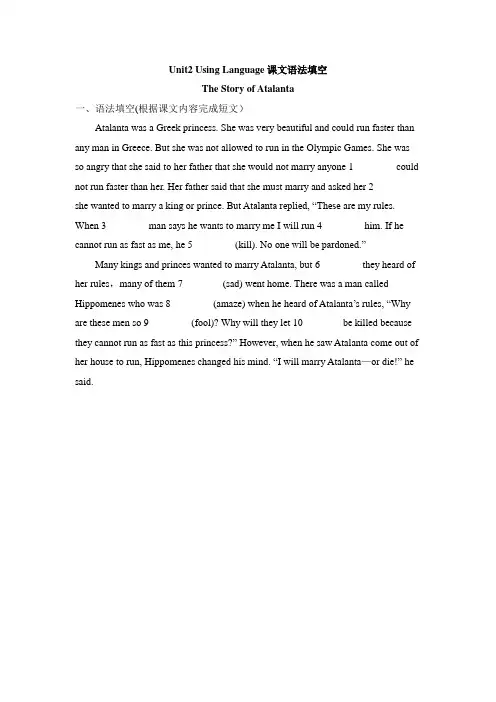
Unit2 Using Language课文语法填空The Story of Atalanta一、语法填空(根据课文内容完成短文)Atalanta was a Greek princess. She was very beautiful and could run faster than any man in Greece. But she was not allowed to run in the Olympic Games. She was so angry that she said to her father that she would not marry anyone 1________ could not run faster than her. Her father said that she must marry and asked her 2________ she wanted to marry a king or prince. But Atalanta replied, “These are my rules. When 3________ man says he wants to marry me I will run 4________ him. If he cannot run as fast as me, he 5________ (kill). No one will be pardoned.”Many kings and princes wanted to marry Atalanta, but 6________ they heard of her rules,many of them 7________(sad) went home. There was a man called Hippomenes who was 8________ (amaze) when he heard of Atalanta’s rules, “Why are these men so 9________ (fool)? Why will they let 10________be killed because they cannot run as fast as this princess?” However, when he saw Atalanta come out of her house to run, Hippomenes changed his mind. “I will marry Atalanta—or die!” he said.参考答案:一、1. who2. whether3. a4. against5. will be killed6. when7. sadly8. amazed9. foolish10. themselves。
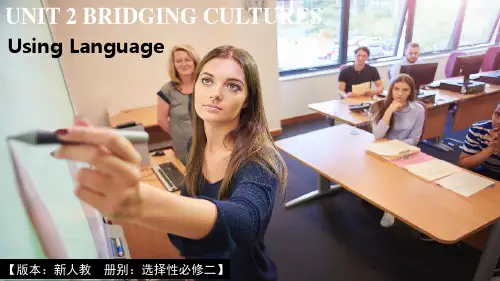

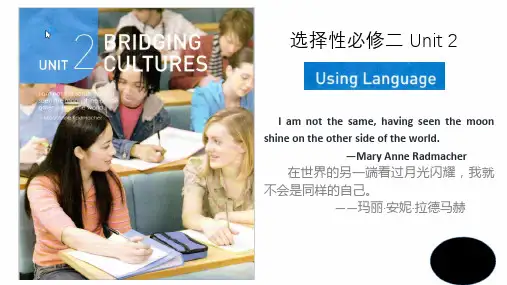
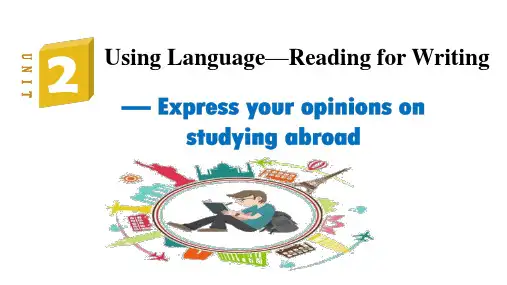
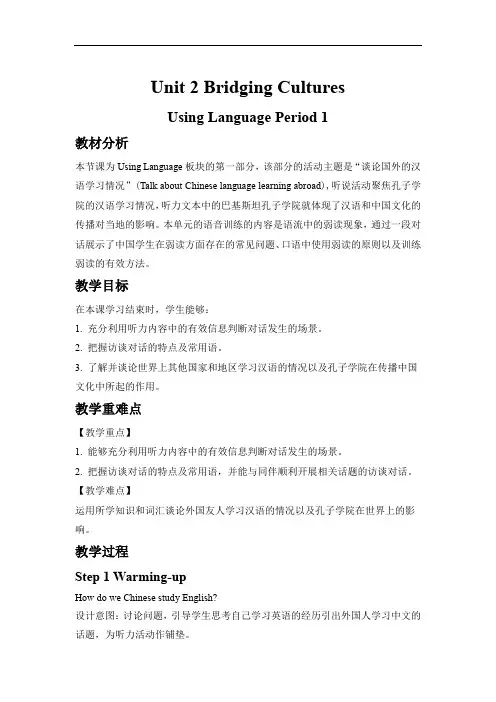
Unit 2 Bridging CulturesUsing Language Period 1教材分析本节课为Using Language板块的第一部分,该部分的活动主题是“谈论国外的汉语学习情况”(Talk about Chinese language learning abroad),听说活动聚焦孔子学院的汉语学习情况,听力文本中的巴基斯坦孔子学院就体现了汉语和中国文化的传播对当地的影响。
本单元的语音训练的内容是语流中的弱读现象,通过一段对话展示了中国学生在弱读方面存在的常见问题、口语中使用弱读的原则以及训练弱读的有效方法。
教学目标在本课学习结束时,学生能够:1. 充分利用听力内容中的有效信息判断对话发生的场景。
2. 把握访谈对话的特点及常用语。
3. 了解并谈论世界上其他国家和地区学习汉语的情况以及孔子学院在传播中国文化中所起的作用。
教学重难点【教学重点】1. 能够充分利用听力内容中的有效信息判断对话发生的场景。
2. 把握访谈对话的特点及常用语,并能与同伴顺利开展相关话题的访谈对话。
【教学难点】运用所学知识和词汇谈论外国友人学习汉语的情况以及孔子学院在世界上的影响。
教学过程Step 1 Warming-upHow do we Chinese study English?设计意图:讨论问题,引导学生思考自己学习英语的经历引出外国人学习中文的话题,为听力活动作铺垫。
Step 2 Pre-Listening1.Discuss the two questions with your partner.(1) What do you know about Chinese language learning abroad?(2) How do people from other countries get to know Chinese culture?设计意图:引导学生就世界上其他国家和地区学习汉语的情况展开讨论,激活学生的背景知识。
